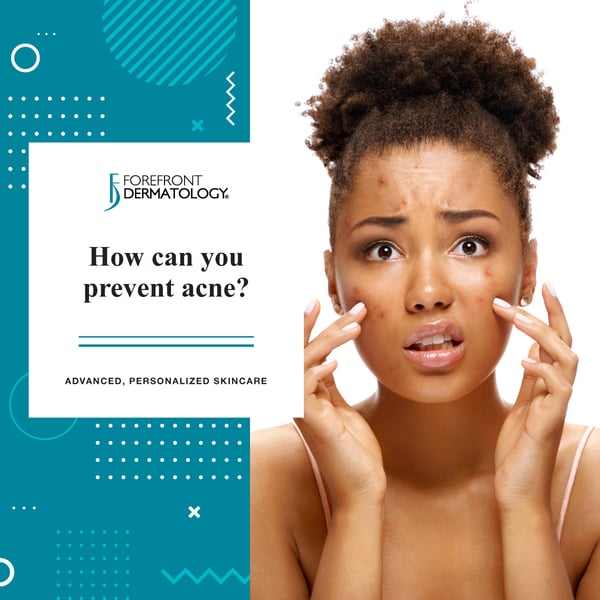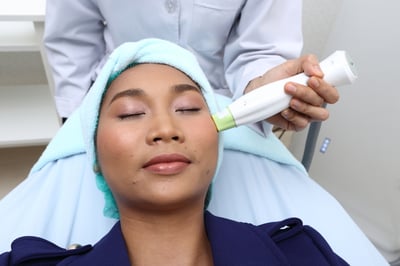
What causes a pimple is pretty much the same regardless of how old you are. According to Dr. J. Mark Jackson, board-certified dermatologist, “When you combine the skin’s oil, dead skin cells, and bacteria, a pore becomes plugged, inflammation develops, and a pimple appears. Some are small and near the surface, and go away pretty quickly, where others are deeper in the skin, more painful, and tend to take a while to disappear. Beyond the basics of what causes acne, there are two big factors that affect your odds of getting acne at any age:
• Family History: If your mom and/or dad had acne, you are very likely to develop it as well in your teens. If they suffered from acne as adults as well, your likelihood of experiencing it in adulthood also increases.
• Hormones: When hormones surge—which happens during adolescence, stress, and during pregnancy—breakouts become more likely. This is a primary reason why, for many people, acne improves after their teenage years and after pregnancy. Your hormones have leveled off and no longer fuel those bad breakouts.”
While the factors that cause acne can vary from person to person, tactics on how to prevent acne are general enough that everyone can apply them to their lifestyle and likely see a positive impact on their skin health.
Clean your cellphone
Cleaning your cell phone is probably not the first thing you think to do. We are all guilty of skipping this from time to time. Think about it for a second though – you rest your phone right about against the side of your face. Then maybe your arms get tired so you switch it to the other side. You have taken that bacteria-covered cell phone and spread bacteria all over your face potentially causing future breakouts. The oils from makeup and our skin unknowingly accumulate on our cell phones. If you are seeing breakouts happening on your cheek or jaw, your cellphone could be the possible cause.
Wash your pillowcase
Just like a cell phone collects your skin oils and dead skin cells so can your pillow case. Regularly washing your pillow case as well as sleeping on your back can help eliminate acne caused during sleep. Specifically sleeping on your back can keep pores open and refreshed, preventing angry breakouts and flare-ups the next day.
Eat a balanced diet, focusing less on processed foods
Foods that cause your blood sugar to rise quickly boost your insulin levels. Too much insulin can trigger changes in your body that in turn boost the activity of oil producing glands. According to a study by the American Journal of Nutrition, you may have fewer breakouts if you add more whole grains, beans and veggies to your diet while cutting back on the pasta, white rice, white bread, dairy and sugar.
Stop touching your face – even if you don’t realize you do it!
You may think you don’t touch your face often, but do you ever subconsciously touch it throughout the day? Maybe rest your chin in your hand or rub your hands on your face if you are tired? Take some time throughout your day and try to pay attention to the amount of times you touch your face. Touching your face all day quickly makes it the dirtiest part of your body. It is important to not only wash your hands, but your face.
Reduce your stress levels
Stress not only affects acne flare-up, but also worsens your overall skin health. It is common for stress to cause your skin to produce more oil. The best solution is to find a daily stress reliever that works for you. For some it may be doing yoga or reading a book and for others just getting a relaxing night’s sleep will help reduce those stress levels.
Wash your face before bedtime
Oil on the skin makes for a breeding ground of bacteria, and bacteria will cause blemishes. Sleeping with not only your makeup on, but also the addition of oil, dirt and debris that has built up on the skin during the day, can trigger new acne breakouts.
Stop popping pimples
When you pop a pimple you run the risk of pushing the bacteria deeper or spreading it around underneath your skin, multiplying your pimples. This is especially true with the deep cystic lesion.
Stop wearing fitted clothing
Have you been wearing a hat or maybe a fitted shirt lately? Anything that can trap sweat and bacteria against your skin can clog your pores and develop pimples. If you must wear a hat or fitted shirt try to pick a material that is moisture wicking to help pull the sweat away from your skin. Ideally though, it is best to wear lose-fitting clothing and regularly wash your skin with a cleansing product.
Struggling with Acne?
The board-certified dermatologists at Forefront Dermatology are specialists in acne, acne treatment and acne scar treatment. Find a dermatologist near you and schedule your consultation today.





